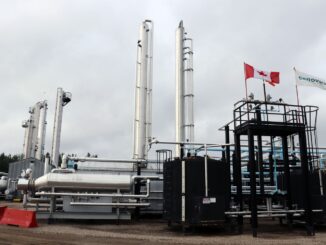
Energy News Beat Publishers Note: This is an outstanding accomplishment for a midstream company to branch out and embrace the green market and ESG.
Tidewater Midstream and Infrastructure Ltd. (“Tidewater” or the “Company“) is pleased to provide an update on various renewable energy initiatives it has been undertaking over the past 6-12 months. These initiatives include opportunities in renewable diesel, co-processing, renewable hydrogen, blue hydrogen, renewable natural gas, carbon capture, and other various renewable energy projects (together the “Renewable Initiatives“).
Renewable Diesel and Renewable Hydrogen Project
Tidewater’s largest current Renewable Initiative is a 3,000 barrels per day renewable diesel and renewable hydrogen complex located on the site of Tidewater’s existing Prince George Refinery in BC (the “PGR“), for an estimated total project cost of $215 to $235 million. The renewable diesel and renewable hydrogen complex will be a stand-alone renewables complex focused on 100% renewable feedstock and will include a pretreatment facility to provide Tidewater significant flexibility on running various renewable feedstocks. Tidewater has received BC government commitments of approximately $100 million in the form of BC Low Carbon Fuel Standard Credits (based on the current market value) for the construction of the complex, representing approximately 45% of the mid-point total project cost of approximately $225 million. Project funding is predicated on management’s current estimate of the asset generating over $75 million of EBITDA in its first year of operations, which is anticipated as early as 2023, and excludes any incremental EBITDA upside from hydrogen production and the credit value associated with the Canadian Clean Fuel Standard. The consumer use of the produced renewable diesel and renewable hydrogen is expected to reduce carbon intensity and related GHG emissions by approximately 80-90% and 65-75% respectively, versus conventional diesel which represents the equivalent of removing approximately 70,000 – 80,000 vehicles from the road annually. Tidewater is working through additional means to further reduce the carbon intensity of the renewable diesel to be produced.
Co-Processing Projects
Tidewater is completing a canola co-processing project for approximately $10 million in capital, that is expected to commence operations in the fourth quarter of 2021 and is currently estimated to generate over $5 million of EBITDA per year. Tidewater also expects to complete a Fluid Catalytic Cracking (“FCC”) co-processing project at the PGR, for an approximate $10 million in capital, during the next scheduled refinery turnaround in the Spring of 2023. Project funding of the FCC co-processing project is predicated on management’s current estimate of the asset generating over $5 million of annualized EBITDA once it commences operations. Both co-processing projects have received material BC government support in the form of BC Low Carbon Fuel Standard credits that significantly reduce Tidewater’s net capital contribution. The renewable diesel and renewable gasoline produced by the co-processing projects will have a carbon intensity of approximately 80-90% less than conventional fuels.
Tidewater is grateful to have received early support from the Provincial and Federal governments on these various opportunities. Tidewater’s existing assets in BC and Alberta provide the Company with a strategic advantage in relation to the increasing federal carbon tax, Canadian Clean Fuel Standards credits, and BC Low Carbon Fuel Standard credits.
Tidewater is also pursuing other Renewable Initiatives that are at various stages of development. These initiatives are expected to increase the size and scale of the company’s renewable portfolio, and to concurrently add to EBITDA with attractive investment returns.
“We are pleased and excited at Tidewater to continue our effort in carbon reduction through the development of our Renewable Initiatives,” said Joel MacLeod, Tidewater Chairman and Chief Executive Officer. “The support shown by the BC and federal governments has been tremendous and we are thankful for the confidence they placed on our renewable energy projects.”
“Tidewater’s renewable energy initiatives show BC’s Low Carbon Fuel Standard in action. Credits from the program are supporting projects that will lead to the production of more renewable fuels, while generating new jobs and economic opportunities from BC’s resources,” said Bruce Ralston, Minister of Energy, Mines and Low Carbon Innovation. “Fuel suppliers have a vital role to play in our government’s plans to reduce greenhouse gas emissions from transportation fuels and achieve our climate targets. I applaud Tidewater’s efforts and investments to advance these innovative projects.”
Tidewater continues to evaluate options to fund its Renewable Initiatives without incurring additional corporate indebtedness, with the Company’s primary objective remaining to deleverage through 2021.
In connection with these efforts, Tidewater has engaged CIBC Capital Markets and National Bank Financial Inc. as financial advisors to assist the Company in understanding the available external financing alternatives to further advance the Renewable Initiatives in an accretive and deleveraging manner.
Cautionary Notes
Advisory Regarding Forward-Looking Statements
Certain statements in this news release are “forward-looking information” within the meaning of applicable Canadian securities legislation (“forward-looking statements”). Such forward-looking statements relate to possible events, conditions or financial performance of the Company based on assumptions about future economic conditions and courses of action. All statements other than statements of historical fact are forward-looking statements. In some cases, forward-looking statements can be identified by terminology such as “anticipate”, “believe”, “continue”, “could”, “estimate”, “expect”, “forecast”, “intend”, “may”, “objective”, “ongoing”, “outlook”, “potential”, “project”, “plan”, “should”, “target”, “would”, “will” or similar words suggesting future outcomes, events or performance. These statements involve known and unknown risks, assumptions, uncertainties and other factors that may cause actual results or events to differ materially from those anticipated in such forward-looking statements. Although the Company believes there is a reasonable basis for the expectations and assumptions reflected in the forward-looking statements, undue reliance should not be placed on the forward-looking statements because the Company can give no assurances that they will prove to be correct. The forward-looking statements contained in this news release speak only as of the date hereof and are expressly qualified by this cautionary statement.
Specifically, this news release contains forward-looking statements relating to, but not limited to: the Renewable Initiatives opportunities; production at the PGR; plans for, and anticipated outcomes of, the renewable diesel and renewable hydrogen complex at the PGR, the canola co-processing project, and the FCC co-processing project at the PGR; receipt of government funding commitments; anticipated costs and capital outlay associated with the Renewable Initiatives projects; consumer use and demand for renewable diesel, renewable hydrogen and other renewable resources; expected timing and results of the Renewable Initiatives projects; expected environmental impact of the Renewable Initiatives, including reduction of greenhouse gas emissions and lower carbon intensity as compared to conventional products; availability of further opportunities to reduce the carbon intensity of the renewable diesel produced at the PGR; potential future benefits from increasing federal carbon tax, Canadian Clean Fuel Standards credits, and BC Low Carbon Fuel Standard credits by leveraging off the Company’s existing assets in BC and Alberta; success and viability of other Renewable Initiatives expected to increase the size and scale of the Company’s renewable portfolio and results; federal carbon tax and fuel standards credits available and applicable to the Company; the Company’s plans to continue evaluation of options to expand and fund Renewable Initiatives; and the Company’s plans to deleverage through 2021.
Such forward-looking statements are based on a number of assumptions which may prove to be incorrect. In addition to other assumptions identified in this document, assumptions have been made regarding, among other things: Tidewater’s ability to execute on its business plan; the timely receipt of all governmental and regulatory approvals or commitments; the availability of capital to fund planned and future capital expenditures; that third parties, counterparties and governments will provide any necessary and expected support; that there are no unforeseen events preventing the performance of contracts; ability to negotiate and enter into new commercial arrangements relating to the Renewable Initiatives with counterparties, customers and other third parties; the viability, costs, results and environmental impact of the Company’s various Renewable Initiatives, including both current and planned projects; the Company’s operating activities and results from operation based on key input assumptions, including incremental and one-time project and operating costs, revenue and EBITDA; ability to complete Renewable Initiatives projects within expected timeframes and costs; availability of third party participation required for completion of the Company’s planned Renewable Initiatives projects; current industry conditions, laws and regulations continuing in effect (or, where changes are proposed, such changes being adopted as anticipated); consumer use and demand for renewable diesel, renewable hydrogen and other renewable resources; general demand for renewable products; availability of capital for Renewable Initiatives projects on commercially reasonable terms; counterparty participation in Renewable Initiatives projects; and the availability and amount of governmental carbon tax and fuel standards credits applicable to the Company.
Actual results achieved will vary from the information provided herein as a result of numerous known and unknown risks and uncertainties and other factors, including but not limited to: general economic, political, market and business conditions, including fluctuations in interest rates, foreign exchange rates stock market volatility and supply/demand trends; the uncertain impacts of COVID-19 on the Company’s business, and the societal, economic and governmental response to COVID-19; activities of producers and customers and overall industry activity levels; operational matters, including potential hazards inherent in the Corporation’s operations and the effectiveness of health, safety, environmental and integrity programs; actions by governmental authorities, including changes in government regulation, tariffs, taxation and credit programs, including changes to the commitments the Company has received from governmental authorities in respect of the Renewable Initiatives; changes in operating and capital costs, including fluctuations in input costs; ability to access sufficient capital to fund Renewable Initiatives; and changes in demand for renewable products.
The foregoing lists are not exhaustive. Additional information on these and other factors which could affect the Company’s operations or financial results are included in the Company’s most recent annual information form and in other documents on file with the Canadian Securities regulatory authorities.
The above summary of assumptions and risks related to forward-looking statements in this news release has been provided in order to provide shareholders and potential investors with a more complete perspective on Tidewater’s current and future operations and such information may not be appropriate for other purposes. There is no representation by Tidewater that actual results achieved will be the same in whole or in part as those referenced in the forward-looking statements and Tidewater does not undertake any obligation to update publicly or to revise any of the included forward-looking statements, whether as a result of new information, future events or otherwise, except as may be required by applicable securities law.
This news release contains financial outlook information about projected results of operations, EBITDA and operating costs, which are subject to the same assumptions, risk factors, limitations and qualifications as set forth in the above paragraphs. The financial outlook information was approved by management of Tidewater as of the date of this news release and was provided for the purpose of providing further information about the Company’s anticipated future business operations. Readers are cautioned that reliance on such information may not be appropriate for other purposes. Tidewater disclaims any intention or obligation to update or revise any financial outlook information contained in this news release, whether as a result of new information, future events or otherwise, unless required by applicable securities law.
Non-GAAP Measures
This press release refers to “EBITDA” which does not have any standardized meaning prescribed by generally accepted accounting principles in Canada (“GAAP”). EBITDA is calculated as income or loss before interest, taxes, depreciation, share-based compensation, unrealized gains/losses, non-cash items, transaction costs, items that are considered non-recurring in nature and the Corporation’s proportionate share of EBITDA in their equity investments.
Tidewater’s management believes that EBITDA provides useful information to investors as it provides an indication of results generated from the Corporation’s operating activities prior to financing, taxation and non-recurring/non-cash impairment charges occurring outside the normal course of business. EBITDA is used by management to set objectives, make operating and capital investment decisions, monitor debt covenants and assess performance. In addition to its use by management, Tidewater also believes EBITDA is a measure widely used by security analysts, investors and others to evaluate the financial performance of the Corporation and other companies in the midstream industry. Investors should be cautioned that EBITDA should not be construed as alternatives to earnings, cash flow from operating activities or other measures of financial results determined in accordance with GAAP as an indicator of the Corporation’s performance and may not be comparable to companies with similar calculations.
For more information with respect to financial measures which have not been defined by GAAP, including reconciliations to the closest comparable GAAP measure, see the “Non-GAAP Measures” section of Tidewater’s most recent MD&A which is available on SEDAR.
Additional information relating to Tidewater is available on SEDAR at www.sedar.com and at www.tidewatermidstream.com.
SOURCE Tidewater Midstream and Infrastructure Ltd.

For further information: Joel MacLeod, Chairman, President and CEO, Tidewater Midstream & Infrastructure Ltd., Phone: 587.475.0210, Email: jmacleod@tidewatermidstream.com



